Mar
17
2011
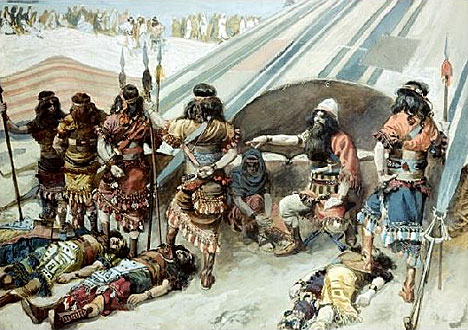
or OH&S in Eden
I mentioned in a post the other day that silver is bridal, and that silver was relegated to the tent poles, the outer court, until the Tabernacle died, was resurrected and transfigured into the Temple of Solomon. [1] The reason was that the Sanctuary was the King’s Court, a place that was not safe for criminals. It demanded that justice be satisfied with a constant presentation of fresh blood.
Continue reading
Comments Off | tags: Baptism, Circumcision, Deuteronomy, Genesis, Joshua, Resurrection, Silver, Solomon, Tabernacle, Table of Showbread, Temple | posted in Biblical Theology, Creation
Mar
16
2011
or Reading Between the Lines

Many, or most, evangelicals, assume that God is into spoonfeeding us. They think that if a biblical type is not explicitly referred to in the text, then it is risky business. Many evangelicals are brilliant thinkers, but most are not lateral thinkers when it comes to literature. Or at least, they are too cautious to think laterally when analysing the Bible, and only read “the letter of the law.” They, and their congregations, miss out on 50% of the Scriptures — all the parts written between the lines. The funniest part is that this is exactly the element that makes many children’s books, and the most delicious adult dramas, so entertaining. What a bunch of bores. They are like the naive Australians in a Noel Coward play who took every word of the sophisticated Brits at face value. The Bible is far more sophisticated than any other book on your shelf. It is indeed a crafty beast.
Continue reading
13 comments | tags: Genesis, Hermeneutics, James Jordan, Luke, Satan, Typology | posted in Biblical Theology
Mar
15
2011
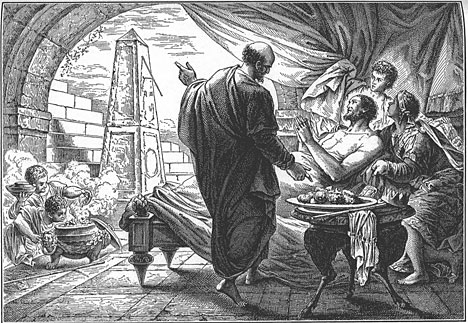
or Raising Up the Temple
An analysis of the literary structure of Day 5 of Creation and passages that are apparently parallel.
Continue reading
Comments Off | tags: Altar of the Abyss, Chiasm, Creation Week, Deuteronomy, Ezekiel, Genesis, Hezekiah, Incense Altar, Isaiah, Literary Structure, Tabernacle | posted in Bible Matrix, Biblical Theology, Creation, The Last Days
Jan
26
2011

or Calling Security
NOTE: THIS POST HAS BEEN REMIXED AND INCLUDED IN GOD’S KITCHEN.
Years ago, I remember a preacher listing for his audience all the sins that will make you prematurely old. I figured the second part of his sermon to us would be a list of all the benefits of Christian living that keep you young. Well, they are obvious. Don’t tick the boxes in list one. Very wisely, that’s not what he gave us. He listed all the things the Lord expects of us, things that also make us prematurely old. His point was, grow old doing good, not evil.
Continue reading
Comments Off | tags: Church Discipline, Discipleship, Dominion Theology, Doug Jones, Genesis, Paul | posted in Christian Life
Jan
25
2011
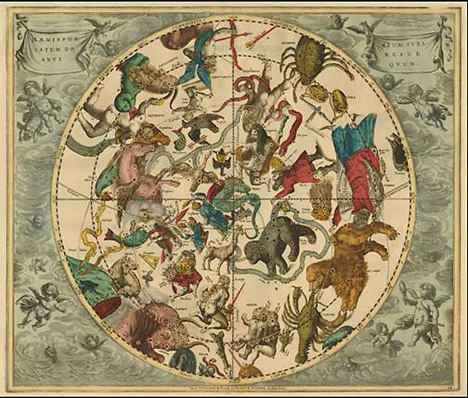
or Ulterior Motifs
Jesus’ reference to sun, moon and stars in Matthew 24 has nothing to do with the physical world, and everything to do with the microcosmic world of the Temple. Because of this, the Covenant Creationists think Genesis 1 is only about the Covenant with Adam, not about physical creation. They’re wrong, just as the literalists are wrong about Matthew 24 predicting the end of the world.
Continue reading
2 comments | tags: Baptism, Covenant Creationism, Creation Week, Dispensationalism, Genesis, Lampstand, Literary Structure, Matthew 24, Tabernacle, Table of Showbread | posted in Against Hyperpreterism, Bible Matrix, Biblical Theology, Creation, The Last Days
Dec
28
2010

“Who may ascend into the hill of the LORD?
Or who may stand in His holy place?
He who has clean hands and a pure heart…” (Psalm 24:3-4)
In Leviticus, an Israelite is to lay his hand on the sacrifice that covers his sin and allows him to draw near to God. It was the red hand of death and the whiteness of a pure sacrifice willing to take the “stroke” (plague).
“And Abraham stretched out his hand and took the knife to slay his son.”
Genesis 22:10
But the Lord Himself covered Moses with His hand as the consuming fire of His glory passed-over the mountain. It was the hand of life and the whiteness of imparted glory. As far as was possible, Moses saw the Lord as He was, because he was like Him.
Continue reading
Comments Off | tags: Abraham, Genesis, Leviticus, Moses, Passover, Revelation, Typology | posted in Biblical Theology, Totus Christus
Dec
16
2010

“Then Jesus told them: You can be sure that tax collectors and prostitutes will get into the kingdom of God before you ever will! When John the Baptist showed you how to do right, you would not believe him. But these evil people did believe. And even when you saw what they did, you still would not change your minds and believe.” (Matthew 21:31-32)
James Jordan teaches you to observe the universals in Scripture. I believe one of the most important is the Totus Christus pattern, head and body, and its counterfeits and distortions.
As mentioned around here a couple times (sorry, a couple of times. I’ve been reading too many Americans), the curse upon Adam concerned his head, and his responsibility to provide for and protect the body. The curse upon Eve concerned her body, her role in producing offspring. Both curses were a limited form of barrenness.
But what of the relationship between head and body? James Jordan writes:
Continue reading
2 comments | tags: Abortion, Altar of the Abyss, Covenant curse, Covenant Theology, Doug Wilson, Genesis, James Jordan, Marriage | posted in Biblical Theology, Quotes, The Last Days, Totus Christus
Dec
14
2010
or God is a Foodie
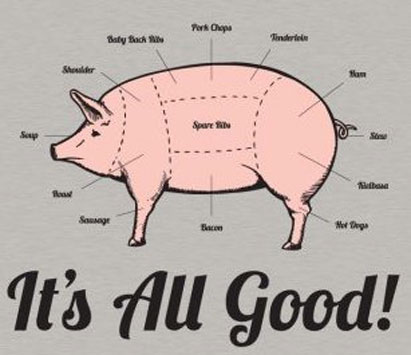
The Mosaic dietary laws were temporary. Just as a Nazirite made a temporary vow for the purpose of sanctification for holy war, so Israel’s purpose as a nation of holy warriors included certain abstinences prescribed by God. Once the war was over, the prohibitions were removed. “Bridal food” (the Feast of Tabernacles) was back on the menu in the first century.
The Nazirite vow was a symbolic form of death and resurrection, of the bridegroom going into the grave (short hair), slaying the serpents, and emerging from the chamber with His bride (long hair), whom He then presented to the Father. [1] The prohibition on the Tree of Knowledge was a temporary one. It began Adam’s holy war, but he broke the vow, failed to rescue the bride and was expelled from the Lord’s table. [2]
Continue reading
11 comments | tags: Communion, Fasting, Food laws, Genesis, Jacob, James Jordan, Leviticus, Nazirite, Robert Farrar Capon, Typology | posted in Biblical Theology, Christian Life, Quotes
Dec
13
2010

“Deny that God speaks to any area of life, and you have denied God’s jurisdiction in that area of life.”
A very intelligent Christian recently posed the question, “What will be the most pressing intellectual challenge facing the church over the next 50 years?” What if the biggest challenge facing the church is not intellectual at all, but ethical. [1]
Continue reading
1 comment | tags: Barth, Brueggemann, C. S. Lewis, Gary North, Genesis, Joseph, Postmillennialism, Socialism, Toby Sumpter, Van Til | posted in Ethics, Quotes
Dec
1
2010
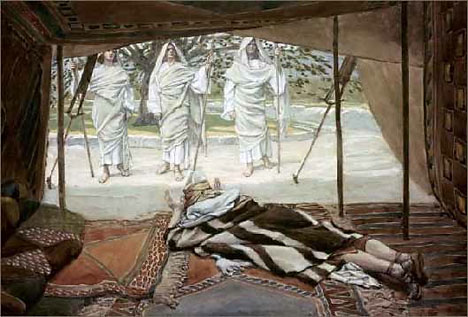
“…of the angels He says:
‘Who makes His angels spirits
and His ministers a flame of fire.’”
God is the source of all things, and He identifies Himself as such in His speeches. Every speech is Covenantal, and every preamble within His speeches is a statement of transcendence. “I am the Lord your God.”
After the initial call comes delegation, Covenantal Hierarchy. A man, a Moses, an Abraham, receives the Word with meekness.
We know that angels are God’s messengers, the sent ones. They administered the Old Covenant as our tutors, Satan becoming the first false teacher, the first corrupt ambassador, or, if you will, the first publican.
[This post has been refined and included in Sweet Counsel: Essays to Brighten the Eyes.]
Continue reading
5 comments | tags: Abraham, Angels, Covenant Theology, Creation Week, Daniel, Genesis, Judges, Leviticus, Nazirite, Nebuchadnezzar, Resurrection, Revelation, Samson, Sodom | posted in Bible Matrix, Biblical Theology, The Last Days



































